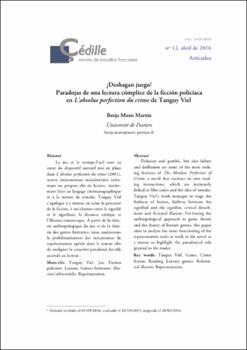¡Deshagan juego! Paradojas de una lectura cómplice de la ficción policíaca en L’absolue perfection du crime de Tanguy Viel
Autor
Mozo Martín, BorjaFecha
2016Resumen
Delusion and gamble, but also failure and disillusion are some of the most striking features of The Absolute Perfection of Crime, a novel that encloses its own reading instructions, which are intimately linked to film codes and the idea of remake. Tanguy Viel’s work manages to stage the frailness of fiction, halfway between the signified and the signifier, critical detachment and fictional illusion. Following the anthropological approach to game theory and the theory of literary genres, this paper aims to analyze the inner functioning of the representation tools at work in the novel as a means to highlight the paradoxical role granted to the reader. Le jeu et le trompe-l’œil sont au cœur du dispositif narratif mis en place dans L’absolue perfection du crime (2001), œuvre éminemment métalittéraire enfermant ses propres clés de lecture, étroitement liées au langage cinématographique et à la notion de remake. Tanguy Viel s’applique à y mettre en scène la précarité de la fiction, à mi-chemin entre le signifié et le signifiant, la distance critique et l’illusion romanesque. À partir de la théorie anthropologique du jeu et de la théorie des genres littéraires, nous analyserons la problématisation des mécanismes de représentation opérée dans le roman afin de souligner le caractère paradoxal du rôle accordé au lecteur.





